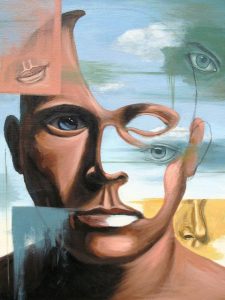Your Identity Puzzle
There are so many possible pieces to put into your identity puzzle. It’s easy to miss a lot of the pieces if you don’t capture them in one place, so the following chart is provided to make it easy to capture your thoughts as they occur. Each time you come back, your previous thoughts will be available and you can just build on them.

Tough Times When the Puzzle Isn’t Complete or the Identity You Want
Putting together the various factors that combine to form an identity can be a tough process. There are so many potential elements and a lot of them are just emerging or feel incomplete. Some may not be exactly what you hope they will be (at least right now).
One key is to focus on the big picture – the rich combination of factors that combine to form an emerging identity. If a few of these elements are not yet what you want them to be, don’t let them dominate. Focus on all the elements (from purpose and characteristics to activities and capabilities) that are starting to create your identity puzzle.
You’ve Just Begun. You’re not finished by any stretch of the imagination, so you can also get excited about what you can still discover and what you might add next. Elements that you have not yet explored are not failures – they are just part of the puzzle that can be explored next.
Identities Continue to Evolve. This is a journey and your identity will continue to grow and deepen if you continue to pay attention to it. And – remember that it is a heroic journey, which means you must let go of your identity as a child, discover your identity as a young woman or man, and – often the toughest part of all – you must deal with the long period of “inbetweenity” that is natural.
Note. Keep in mind that what is important in your school years in terms of identity may not be as important after school. Some of the elements that seem the biggest in school lose much of their importance after school and new ones take on more importance. For example, being an athlete or part of the “in group” may seem critical in school, but that can quickly be replaced by elements such as being a competent employee or leader, being a parent, making a difference in the community, etc.
My Brand
One way to think about your emerging identity as a young adult is to think about your “brand.” You might think, “I’m not a product like Lexus or a service like Google – why do I need to think about my “brand?”
The value of thinking about your brand is primarily to integrate the various elements that combine to create your identity – the picture you have of yourself and the picture others have of you. It’s a summary – and it’s important.

People Naturally Form a Perception of You – Their Perception of Your Brand
People form impressions of other people. It’s impossible not to. So, people form impressions of you. Those impressions are your brand for those people. Some people will know you well and some will not, but impressions will naturally form your brand.
You Have a Brand. Are You in Charge of it?
If you do not build your brand, others will build it for you. And in today’s world the web will build it for you through social media. Today your brand can be heavily influenced by social media, but it’s not just about social media. It’s more about your face to face interactions, your behaviors in general, your attitude, your appearance, who you hang out with, what you accomplish or don’t accomplish, etc.
How Many Brands Do I Have?
Different people will see you differently – at different points in time. Therefore, you will have a different brand for different people. There may be a lot of similarities, but there will be some differences. For example, your parents will see you differently in some ways than your peers.
Ten Examples
There are a surprising number of people who will have a perception of you – your brand. Here are 10 examples. You can probably come up with even more.
- Parents
- Peers
- Girl/Boyfriend
- Coaches
- Mentors
- Co-workers
- Teammates
- Employers
- Neighbors
- College admissions officers
- Teachers
This list is not intended to be intimidating. It’s just interesting how many different types of people will have an impression of you. We don’t just have one personal brand.
Managing these Brands
The key is to be active in establishing your brand – mostly by being aware of what you want your brand to be and how you can demonstrate who you are. The more active and intentional you are, the more you will be in charge of your brand. That means that your brand will have increased similarity across all these people and it will more likely be the brand you want. Once again, it’s being the author.
WARNING!
This is not about trying to fool people or be someone you are not in order to please others or fit in. That just doesn’t work very well. In most cases, you can’t fool very many people very much for very long. Your personal brand is about being yourself – the self you want to be and the self you want others to see.
Four Keys to Developing Your Brand
In general, there are four guidelines that can guide you in developing your personal brand.
- Pay attention and ask the right questions of yourself. There are a bunch of possible questions in this section. The questions open up the possibilities on the path to discovering and creating your brand.
- Commit to actions that will develop or demonstrate your brand. As you answer the questions some natural actions will suggest themselves. The key here is to be intentional in your actions – know what you want to do and then do it.
- Persevere and “hold the course” through all the challenges and confusions and uncertainty. This takes time and there will be ups and downs along the way, so the key is to keep going and keep learning and keep evolving.
- Talk with people you trust about #1-3 – this is really important. All your peers are faced with the challenge to develop an identity as a young man or young woman. Those that are facing that challenge directly (not all will) can be good sounding boards for you – and you for them. Trusted adults can also be invaluable.
Do you want to know who you are? Don’t ask, act. Action will delineate and define you.
Thomas
Jefferson